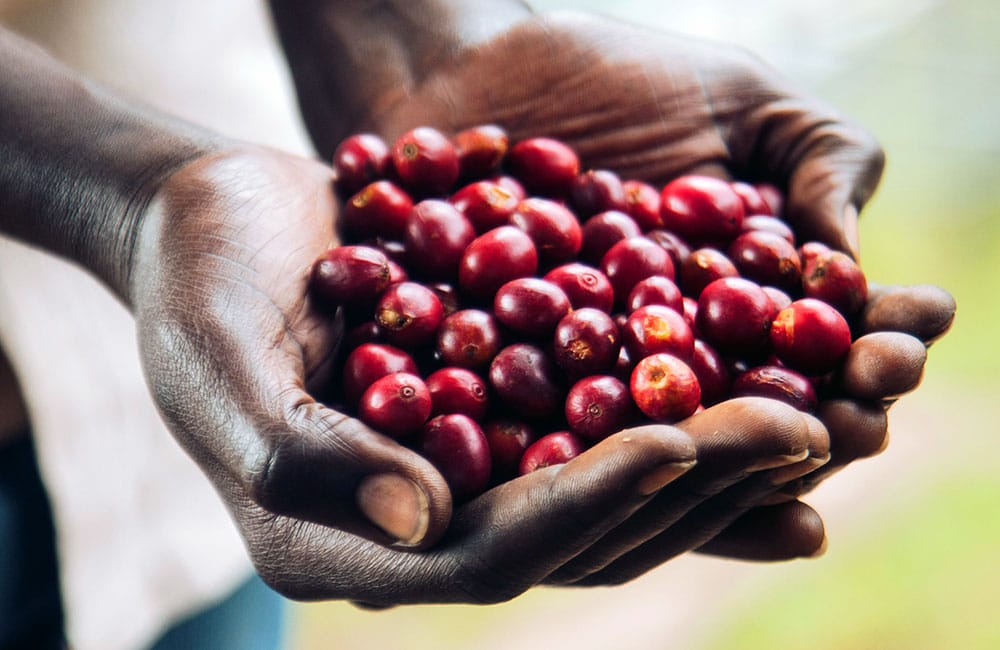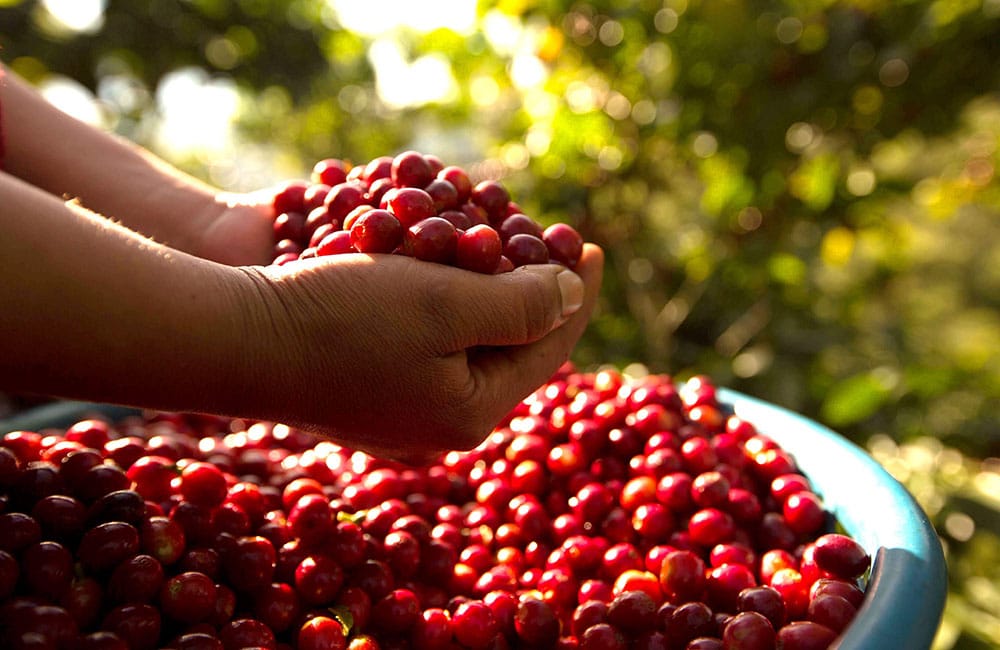1. Historia del Café de Ruanda
El café de Ruanda tiene una historia marcada por la resiliencia y la superación. Introducido durante la era colonial alemana a finales del siglo XIX y promovido por los belgas en el siglo XX, el café se convirtió rápidamente en un cultivo esencial para la economía del país. Sin embargo, la industria cafetera sufrió un duro golpe durante el genocidio de 1994, lo que llevó a un colapso económico generalizado.
En la década de 2000, gracias a iniciativas gubernamentales e internacionales, Ruanda comenzó a reconstruir su industria cafetera, enfocándose en la producción de café de especialidad. Hoy en día, el café de Ruanda es reconocido mundialmente por su calidad excepcional y perfiles de sabor únicos.
2. Regiones Cafeteras de Ruanda

Finca de cultivo de café de especialidad en Ruanda
El café en Ruanda se cultiva principalmente en las regiones montañosas del país, donde el clima templado y la altitud crean condiciones ideales para el cultivo de café Arábica de alta calidad. Algunas de las regiones más destacadas son:
-
Región Occidental (Kivu): Con cafetales cerca del Lago Kivu, produce cafés con acidez brillante y notas frutales intensas.
-
Región Norte (Musanze, Gakenke): Con suelos volcánicos ricos, ofrece perfiles con toques florales, dulzura intensa y una acidez equilibrada.
-
Región del Sur (Huye, Nyamagabe): Famosa por su complejidad de sabores, incluyendo matices de frutos rojos, caramelo y notas especiadas.
3. Variedades de Café en Ruanda

Bourbon rojo y amarillo son las variedades más cultivadas en Ruanda
Ruanda cultiva principalmente café Arábica, siendo las variedades Bourbon rojo y Bourbon amarillo las más comunes. Estas variedades son conocidas por su excelente calidad en taza, con perfiles que destacan por su acidez vibrante, dulzura natural y una complejidad aromática única.
4. Cultivo y Procesos del Café

Estación de procesamiento de café de especialidad en Ruanda
Cultivo
El café en Ruanda se cultiva en pequeñas parcelas gestionadas por familias, que forman parte de cooperativas locales. Las condiciones climáticas, la altitud (entre 1,200 y 2,000 metros sobre el nivel del mar) y el suelo volcánico contribuyen a la producción de granos densos y de alta calidad.
Procesos
-
Proceso Lavado: El más común en Ruanda. Aporta claridad en la taza, resalta la acidez brillante y realza las notas frutales.
-
Proceso Honey: Utilizado en lotes experimentales, aporta dulzura, complejidad y una textura sedosa.
-
Proceso Natural: Menos frecuente, pero en crecimiento, aporta notas frutales intensas, cuerpo más denso y una textura compleja.
5. Temporada de Cosecha

Plantación de café de especialidad en Ruanda
La cosecha principal del café de Ruanda ocurre entre marzo y junio, con una cosecha secundaria menor entre septiembre y noviembre. La recolección manual asegura la selección de cerezas en su punto óptimo de maduración, lo que contribuye a la alta calidad del grano.
6. Perfil de Sabor del Café de Ruanda

El secado sobre camas africanas es habitual en Ruanda
El café de Ruanda es conocido por su acidez brillante, cuerpo medio a ligero y una complejidad aromática que incluye:
-
Notas frutales: Frutos rojos, cereza, arándanos, moras.
-
Matices florales: Jazmín, rosa, lavanda.
-
Toques especiados: Canela, vainilla, nuez moscada.
-
Dulzura natural: Similar al caramelo, miel o azúcar moreno.
7. ¿Qué impacto socio-económico tiene el cultivo de café en Ruanda?

El café de especialidad en Ruanda brinda una oportunidad de prosperidad a pequeños productores
El café es una de las principales exportaciones de Ruanda, generando ingresos significativos para más de 400,000 pequeños productores. Las cooperativas cafetaleras han sido fundamentales para mejorar la calidad de vida de las comunidades rurales, promoviendo la inclusión social, la sostenibilidad ambiental y el empoderamiento de las mujeres.
8. Curiosidades sobre el Café de Ruanda

Uno de nuestros importadores de café de especialidad en Ruanda
-
Apodado el "País de las Mil Colinas": Las colinas crean microclimas óptimos para cafés de alta calidad.
-
Premios internacionales: Los cafés ruandeses han ganado múltiples competencias de la Cup of Excellence, destacando por su calidad excepcional.
-
Potato Defect: Un fenómeno curioso que afecta a algunos granos, pero que se controla eficazmente gracias a mejoras en el procesamiento.
9. Cómo Preparar y Disfrutar el Café de Ruanda
Métodos recomendados: Pour-over, Chemex, Aeropress, para resaltar su acidez y notas frutales vibrantes.
10. Conclusión

Camas africanas de secado de café en Ruanda
El café de Ruanda es un verdadero tesoro del mundo del café de especialidad. Su historia de superación, combinada con condiciones únicas de cultivo y una pasión inquebrantable por la calidad, hacen de cada taza una experiencia inolvidable. Descubre el café de Ruanda y viaja con cada sorbo al corazón de África, donde el café es más que una bebida: es una expresión de cultura, resiliencia y excelencia.








